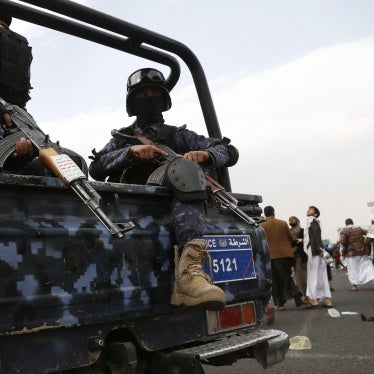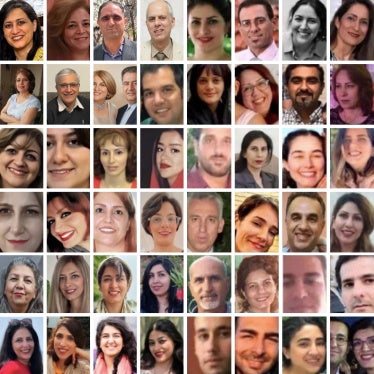(New York) – Iranian authorities should immediately free pastor Yousef Nadarkhani and drop all charges against him, Human Rights Watch said today. Nadarkhani, who has been charged with apostasy and is in Rasht prison in northern Iran, faces possible execution.
Iran’s judiciary claims that Nadarkhani, 33, who was born to a Muslim family, is an apostate due to his adoption of Christianity at age 19. Authorities summoned him to an appeals court on September 25, 2011, said his lawyer, Mohammad Ali Dadkhah. Court officials told him that he had three opportunities to renounce his faith and embrace Islam. The last of the three court sessions, on September 28, ended with Nadarkhani refusing for the third time to recant. A Supreme Court ruling in June had overturned an earlier death sentence against Nadarkhani for apostasy, and ordered the lower court to conduct additional investigations to determine whether Nadarkhani was willing to renounce his Christian faith to avoid execution. Nadarkhani is a member of the evangelical Church of Iran, one of the only Christian communities in the country that proselytizes among Muslims, and pastor to a 400 member congregation in the northern city of Rasht.
“Iran is one of the very few countries in the 21st century where authorities would drag an individual before a court of law and force him to choose between his faith and his life,” said Joe Stork, deputy Middle East director at Human Rights Watch. “Nadarkhani should not have to spend one more day in jail, let alone face execution.”
Security forces initially arrested Nadarkhani in October 2009. In November 2010, a lower court sentenced Nadarkhani to death for “apostasy from Islam,” despite the fact that no such crime exists under Iran’s penal code. On September 22, 2010, Branch 11 of the Gilan Court of Appeals affirmed Nadarkhani’s death sentence for apostasy, but in June 2011 the Supreme Court remanded the case to the lower court for further investigation, ruling that Nadarkhani could not be executed if he had not been a Muslim after the age of maturity – 15 years for boys according to Iranian law – and he repents.
He is currently waiting for the Gilan appeals court to issue its verdict and sentence, and plans to appeal again any death or imprisonment sentence to the Supreme Court.
The Supreme Court rejected arguments that apostasy is not a crime under Iran’s laws simply because it is not codified in the Islamic Penal Code, and held that the crime is recognized in Sharia (Islamic law) and by the founder of the Islamic Republic, Ayatollah Ruhollah Khomeini.
Nadarkhani’s lawyer told Human Rights Watch that his client adopted Christianity at the age of 19, and that prior to that he did not consider himself a Muslim or an adherent of any religion. The lawyer said the debate surrounding whether Nadarkhani was a Muslim before reaching puberty was also not based in law since apostasy does not exist as an offense in Iran’s Islamic Penal Code.
Since 2009, intelligence and judiciary officials have carried out many arrests against evangelical or Christian converts in Iran. One of their main targets is the Church of Iran, an evangelical congregation with members throughout the country. Earlier in September an appeals court upheld one-year sentences against six members of the Church of Iran who were convicted on charges of “propaganda against the state,” reportedly for proselytizing. Authorities initially threatened to charge the pastor of the Shiraz Church of Iran, Behrouz Sadegh-Khanjani, with apostasy, but dropped the charge.
Officials have also targeted and arrested other evangelical or Protestant groups, including home churches. In December 2010 and January 2011, security forces arrested about 70 Christians reportedly affiliated with evangelical churches. On July 18, 2010, security forces had arrested 15 Christians in Mashad as they were leaving for a meeting with fellow members in the city of Bojnourd. Authorities rarely charge evangelical Christians with apostasy, and instead rely on more traditional charges such as “acting against the national security,” “propaganda against the regime,” or “insulting Islamic sanctities.” Christian groups claim that authorities have arrested more than 250 Christians throughout Iran between June 2010 and February 2011.
Unlike traditionally recognized Christian minorities in Iran, like Armenians, Assyrians, and Chaldeans, evangelical Christian churches conduct their services in Persian. Authorities accuse them of spreading religious literature in Persian in an attempt to attract Muslims to their faith. In February, Morteza Tamadon, the governor of Tehran province, compared evangelical Christians to Sunni extremists and the Taliban, telling the Islamic Republic News Agency that they were “false, deviant and corrupt cults.” “We have caught the leaders of this movement in Tehran province and numerous others will be arrested in the near future,” he added.
During a visit to Qom in October 2010, the supreme leader, Ayatollah Seyed Ali Khamenei, spoke of the “need to combat false and misleading beliefs,” a reference to evangelical or Protestant churches, the Nematollahi Gonabadi Sufis, and Baha’is. High-level Iranian officials, including leaders of the clerical establishment, have expressed concern at what they see as the rising popularity of non-Muslim faiths or beliefs, especially among youth.
In 2006 President Mahmoud Ahmadinejad empowered the General Cultural Council to implement policies aimed at confronting “deviant groups,” especially those of a spiritual or religious nature. The General Cultural Council is an arm of the Supreme Council of the Cultural Revolution, an executive agency charged with promulgating regulations in public sector employment and education.
International law strictly prohibits discrimination and persecution based on religion. Article 18(2) of the International Covenant on Civil and Political Rights (ICCPR), ratified by Iran, states, “No one shall be subject to coercion which would impair his freedom to have or to adopt a religion or belief of his choice.” Article 27 of the ICCPR says that members of religious minorities shall not be denied the right to profess and practice their own religion.
Article 13 of Iran’s constitution recognizes Christianity as a protected minority religion, and article 14 provides that “all Muslims are duty-bound to treat non-Muslims in conformity with ethical norms and the principles of Islamic justice and equity, and to respect their human rights.” Article 26 guarantees freedom of association for religious societies.
“Both international and Iranian law require Iranian officials to safeguard the equality and human rights of all Christians, regardless of whether they are historic communities such as the Armenians, Assyrians, and Chaldeans, or Christian converts,” Stork said.








